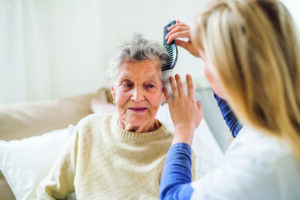 Caring for anyone with memory loss is difficult. Patients with memory loss can be fearful. Unsure of what’s happening around them. Imagine, after all, forgetting the faces of your loved ones. Driving and suddenly realize you can’t recall your destination.
Caring for anyone with memory loss is difficult. Patients with memory loss can be fearful. Unsure of what’s happening around them. Imagine, after all, forgetting the faces of your loved ones. Driving and suddenly realize you can’t recall your destination.
I’ve spent seven years working as a nurse caring for patients suffering from memory loss. It isn’t easy work. It requires me to empathize with patients, to help soothe their fears when I can. Along the way, I’ve realized their caregivers also need my attention.
Patients are not the only ones impacted when they are diagnosed with dementia. Their caregivers are affected just as much. They will be there to care for the patient when the patient forgets those closest to them — including the caregiver themselves.
When evaluating a patient for memory loss, the patient’s primary caregiver or family will discuss their concerns with the doctor. The patient may be misplacing belongings, forgetting names, faces and locations of places they know well —like the grocery store.
The patient also comes in for an evaluation. At times, depending on the severity of their memory loss, the patient sits in silence. Sometimes they are unsure of what is happening or why they are visiting the doctor’s office. Patients may be unable to answer the clinical questions required to assess for dementia because they simply cannot remember what was said just a few minutes ago.
Many patients suffering from dementia are fearful. They may be fearful when they are left alone. As a nurse, the best thing I can do is remind them of where they are, what’s being done.
Caregivers sometimes cry and become frustrated expressing their concerns. They are not physically losing their family member, but almost feel as if they are. The strain of having to care for their loved one, make sure the environment is safe for them and frequently having to remind them of reality can be exhausting.
It is essential to educate a patient’s caregiver about how the patient feels, about how the patient is experiencing the world around them. Encouraging the caregiver to get help when they experience burnout is vital.
This small step can ensure a better, more positive experience for both the caregiver and person experiencing memory loss. It’s a win-win situation for both.
No one should have to deal with Alzheimer’s or dementia alone. The Alzheimer’s Association – Hawaii provides resources to support both unpaid family caregivers and professional caregivers.
Support for Alzheimer’s disease or a related dementia:
24/7 Helpline 800-272-3900 | 808-591-2771
alz.org/Hawaii


Leave a Reply